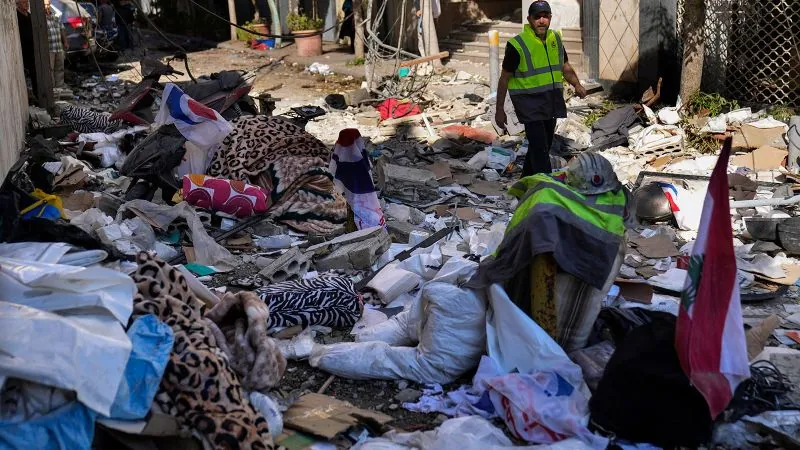
Escalating Tensions: Israel Conducts Unprecedented Airstrikes on Lebanon Amid Iranian Threats
2024-10-04
Author: Yan
Escalating Tensions
In a troubling escalation of military actions, Israel has intensified its airstrikes on Lebanon, reaching levels that surpass even the peak operations of the U.S. military during its two-decade engagement in Afghanistan. According to recent data from conflict monitoring organizations, Israel's bombardment has resulted in over 1,400 fatalities and has injured nearly 7,500 individuals, displacing more than one million people in less than three weeks. The Lebanese health ministry reports that these strikes are particularly devastating, especially when compared to historical conflict data.
Unprecedented Airstrike Rates
In a staggering two-day assault on September 24-25, Israeli forces conducted around 3,000 airstrikes and deployed approximately 2,000 munitions, a rate of fire not seen since the early days of major military operations in the region. Israeli officials assert that the campaign targets Hezbollah strongholds; however, civilian casualties have soared, raising alarm about the humanitarian crisis unfolding in Lebanon.
Impact on Gaza and Humanitarian Concerns
In Gaza, anguished families are mourning children lost to airstrikes on schools, further highlighting the gravity of the volatile situation. Strikes on United Nations schools, which were meant to serve as safe havens for civilians, have sparked outrage and fear within the population, with heartbreaking testimonies from survivors revealing the extreme trauma inflicted on communities in the region.
Iran's Response and Regional Implications
Against this backdrop, Iranian Supreme Leader Ayatollah Ali Khamenei delivered a rare and fervent speech, promising further retaliation against Israel if necessary. Expressing that Iran's recent ballistic missile attack on Israel constituted merely the "least punishment," Khamenei voiced unwavering support for Hezbollah and praised Hamas' initial attacks on October 7. This rhetoric signals a potential for broader hostilities as Iran emphasizes its commitment to support its allies in the region, with Khamenei notably delivering portions of his address in Arabic to connect with Lebanese and Palestinian audiences.
Healthcare Crisis in Lebanon
As these tensions unfold, the World Health Organization has issued grave warnings regarding the state of healthcare in Lebanon, citing the death of numerous medical professionals and the closure of many health facilities under the relentless bombing. With the persistent airstrikes, critical medical supplies are becoming increasingly difficult to transport, leading to severe shortages in hospitals already overwhelmed with casualties.
Mass Evacuations and Displacement
Furthermore, Israeli military operations have prompted mass evacuations, with communities near the border receiving urgent orders to leave their homes as military incursions extend deeper into Lebanon. Reports indicate that around 160,000 individuals have fled to Syria in search of safety since the hostilities reignited.
Global Implications and Response
As the specter of retaliatory attacks looms and regional tensions heighten, Israel's latest airstrikes have expanded to targets in southern Beirut, raising concerns about worsening humanitarian conditions and reminding the world of the delicate and escalating nature of Middle Eastern geopolitics. The next steps from both Israeli leadership and Iranian powers will be closely scrutinized, with potential implications for stability throughout the region as the anniversary of Hamas' earlier attacks approaches. With international observers and governments watching closely, the developments in this crisis may radically reshape responses from global powers, stirring discussions of military strategy and humanitarian intervention in this longstanding conflict.

 Brasil (PT)
Brasil (PT)
 Canada (EN)
Canada (EN)
 Chile (ES)
Chile (ES)
 España (ES)
España (ES)
 France (FR)
France (FR)
 Hong Kong (EN)
Hong Kong (EN)
 Italia (IT)
Italia (IT)
 日本 (JA)
日本 (JA)
 Magyarország (HU)
Magyarország (HU)
 Norge (NO)
Norge (NO)
 Polska (PL)
Polska (PL)
 Schweiz (DE)
Schweiz (DE)
 Singapore (EN)
Singapore (EN)
 Sverige (SV)
Sverige (SV)
 Suomi (FI)
Suomi (FI)
 Türkiye (TR)
Türkiye (TR)